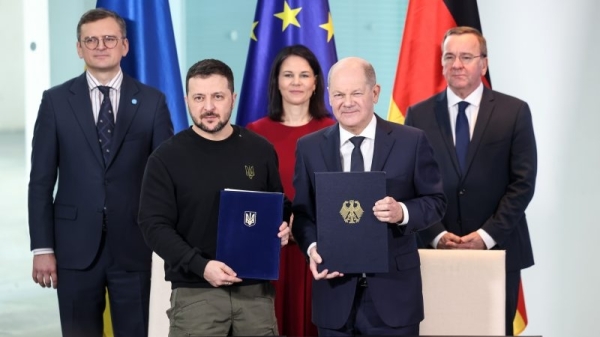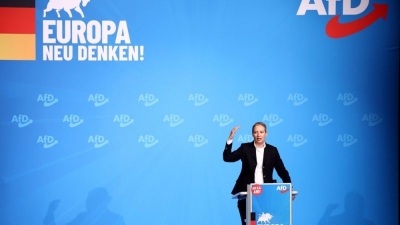Germany becomes second country to sign security agreement with Ukraine

Germany became the second country, after the UK, to sign a bilateral security agreement with Ukraine, providing long-term security guarantees for the war-torn country, German Chancellor Olaf Scholz and Ukraine’s President Volodymyr Zelenskyy announced on Friday (16 February).
With the step, Germany fulfilled the commitment made by the G7 countries in July last year to deter any new Russian attack on Ukraine in the foreseeable future.
The move is also seen as a signal of Europe’s commitment in the face of uncertainties over future aid to Ukraine from the United States, with France expected to follow Germany’s example in the evening.
The German-Ukrainian agreement contained “detailed support agreements” regarding diplomacy, funding, and military aid, which will be provided “in case of any Russian aggression in the future”, Scholz told reporters at a joint press conference with Zelenskyy in Berlin.
The agreement will be valid for ten years, which may be extended bilaterally up to six months before it expires.
The chancellor also highlighted that Germany would support Ukraine in “its path from early to long-term recovery” after the war, as the document states.
This includes support in demining the vast swathes of contaminated Ukrainian land. Russian assets in Germany would also “remain immobilised” until Moscow has paid for war damage, with the agreement committing Berlin to explore “lawful routes” to use assets to support Ukraine.
Zelenskyy praised the “concrete” nature of the contract provisions, saying there were “deadlines, where we will receive support, (…) that every person in Ukraine can count on.”
Support ‘within 24 hours’ of an attack
One such provision is that Germany and Ukraine are obliged to “consult within 24 hours to determine appropriate next steps” in the event of a future Russian attack.
“Ukraine has never had a more valuable and stronger document than the document we signed today,” Zelenskyy said.
Scholz stressed that the contract comes with strings attached for Ukraine as well. The country will be obliged to “continue the reforms that are central to its accession to the EU” as there remain concerns about corruption and the rule of law in Ukraine.
Alongside the agreement, Germany also announced another military aid package worth €1.1 billion, which will include additional howitzers, ammunition, IRIS-T missiles, and an air-defence system.
Germany’s move came as a prominent signal in times of heated debate in NATO following recent comments by Donald Trump and US aid for Ukraine being held up in Congress.
Trump’s announcement that he would “encourage Russia to do whatever the hell it wants” with NATO members falling short of spending targets if he were president had triggered warnings that European countries might have to increasingly rely on their own defence capabilities in the future.
‘European signal’ to America
With the United Kingdom and Germany now having signed the first security agreements and France expected to follow suit, three out of four European G7 countries will have honoured the group’s commitments.
Meanwhile, the agreements of the United States, Canada, and Japan are still pending.
“That is a signal to Putin but also the United States,” August Pradetto, a political scientist emeritus at the Helmut Schmidt University of the Bundeswehr in Hamburg, told Phoenix.
“The European states will do everything (…) to counteract Ukraine’s efforts to counter this aggression and will endeavour to support it as much as possible in the future,” he said.
Regarding tangible benefits, Pradetto pointed out that the agreement was important to consolidate support for Ukraine both in material terms and as part of the domestic debate.
Pradetto’s European point echoed the assessment of Christoph Heusgen, the head of the Munich Security Conference (MSC), which kicked off on Friday.
Heusgen had told ARD earlier in the day the security agreement was an important step towards increasing European engagement for Ukraine.
Notably, the security agreement does not set a date for Ukraine’s accession to NATO, nor does it make detailed reference to the North Atlantic organisation.
In contrast, the signatories have dedicated a full section on collaboration within the European Union as well as Ukraine’s future in the bloc, stating that “Germany will support Ukraine on its path towards EU membership and to offer practical guidance.”
Read more with Euractiv




